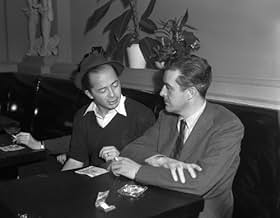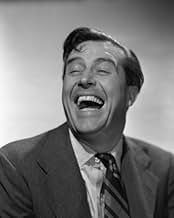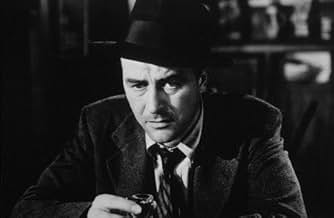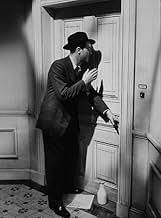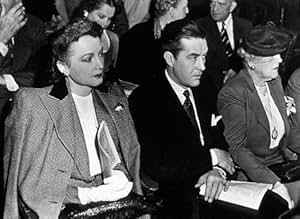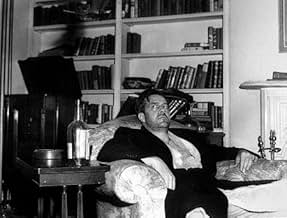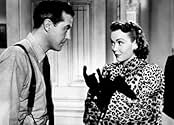CALIFICACIÓN DE IMDb
7.9/10
42 k
TU CALIFICACIÓN
La vida desesperada de un alcohólico crónico se sigue a través de una borrachera de cuatro días.La vida desesperada de un alcohólico crónico se sigue a través de una borrachera de cuatro días.La vida desesperada de un alcohólico crónico se sigue a través de una borrachera de cuatro días.
- Dirección
- Guionistas
- Elenco
- Ganó 4 premios Óscar
- 18 premios ganados y 3 nominaciones en total
Anita Sharp-Bolster
- Mrs. Foley
- (as Anita Bolster)
Andy Andrews
- Alcoholic
- (sin créditos)
Gene Ashley
- Male Nurse
- (sin créditos)
Walter Baldwin
- Man from Albany
- (sin créditos)
Harry Barris
- Pianist at Harry & Joe's
- (sin créditos)
Ian Begg
- Undetermined Secondary Role
- (sin créditos)
Eddie Borden
- Drunk in Alcoholic Ward
- (sin créditos)
Jess Lee Brooks
- Hospital Patient
- (sin créditos)
- Dirección
- Guionistas
- Todo el elenco y el equipo
- Producción, taquilla y más en IMDbPro
Resumen
Reviewers say 'The Lost Weekend' is a groundbreaking film with a realistic portrayal of alcoholism. Ray Milland's performance as Don Birnam is praised for its depth. Billy Wilder's direction and the film's visual style, including deep focus and Miklós Rózsa's haunting score, effectively convey addiction's despair. However, some find it melodramatic and repetitive, with an unrealistic ending. Despite criticisms, it is regarded as powerful and influential in cinema.
Opiniones destacadas
Uncompromising, dark and definitely disturbing Best Picture Oscar winner from 1945 that deals with a writer's (Ray Milland in one of the very best performances ever shown on the silver which deservedly landed him his only Oscar) alcoholism and the effects that his problem has on himself, his work and those closest to him. The love of his life (Jane Wyman) and his very supportive brother (Phillip Terry) try to save Milland from a habit that has gotten terribly out-of-hand. Heart-wrenching flashbacks into Milland's demise are sometimes difficult sequences to get through. In the end it is not a sure thing if Milland can distance himself from his disease and return to a normal life. Billy Wilder's uncompromising direction and screenplay yielded him Oscars in this film that scared many studios away in the early-1940s due to its intense subject matter and the question of whether the film could create interest. Made during a time when patriotic movies and romantic comedic farces dominated the cinema, "The Lost Weekend" was truly unlike anything ever experienced before. A very well-made production that is first class all the way. A real classic in every sense of the term. 5 stars out of 5.
... and not get tired of it. Ray Milland's performance is riveting and, if you are watching for the first time, the first scene will do nothing but raise questions, getting you involved. How did Don (Ray Milland) get to be such an alcoholic? Why does his brother have a right to say how he lives? What does he do for a living? Why does such a seemingly together woman like Helen (Jane Wyman) stay with this guy for three years? All of these questions get answered slowly as the movie unravels over one long weekend that Don was supposed to spend in the country with his brother, but instead spends alone, but thanks to ten dollars that Don's brother left behind, he does not spend it completely alone - he's got money to buy booze.
And yet Don doesn't plan ahead. He thinks enough to cover up the two bottles he buys at the liquor store with some apples that he buys to put up on top of the bag as he walks home so neighbors cannot see the booze, but the urgency doesn't come until he is completely out of liquor and out of the ten bucks to get more. And he is willing to do ANYTHING to get that liquor - he'll pretend to be interested in a girl in a local bar who is obviously crazy about him in order to get a few bucks, he tries to trade his typewriter (he's a failed writer) to a local bar owner for a drink, he steals money from a woman's purse in a nightclub to get booze, he even stages a faux hold-up (he has no gun) to get a bottle from a liquor store.
And that's it for the entire movie - Don Birnham and his quest for the next bottle eats all of his time and energy. Other characters are just instruments in that quest or are in the form of flashbacks to tell you how Don got to where he was in the first scene. And then there's that haunting score that runs the length of the film. Everything is brutal realism UNTIL the last scene. Maybe it was the censors, but today it could have cost the film some Oscars.
A couple of questions never raised. How did Don's brother Wick manage to support himself AND Don all of these years IN New York City? Didn't Wick ever long for a life and family of his own? There's got to be a limit to anybody's patience and charity, even if they are kin. Another question from an old film buff like me - Isn't it odd how the Great Depression and World War II magically disappear from sight in the past that Don is recollecting. 15 years of American history that effected everybody seems to have no place in Don's story. To look at this film, this shiny bustling post-war world has always been there. This is the turn of film from Depression and world war - collective struggles - back to the struggle of the individual with himself, the beginning of noir.
And yet Don doesn't plan ahead. He thinks enough to cover up the two bottles he buys at the liquor store with some apples that he buys to put up on top of the bag as he walks home so neighbors cannot see the booze, but the urgency doesn't come until he is completely out of liquor and out of the ten bucks to get more. And he is willing to do ANYTHING to get that liquor - he'll pretend to be interested in a girl in a local bar who is obviously crazy about him in order to get a few bucks, he tries to trade his typewriter (he's a failed writer) to a local bar owner for a drink, he steals money from a woman's purse in a nightclub to get booze, he even stages a faux hold-up (he has no gun) to get a bottle from a liquor store.
And that's it for the entire movie - Don Birnham and his quest for the next bottle eats all of his time and energy. Other characters are just instruments in that quest or are in the form of flashbacks to tell you how Don got to where he was in the first scene. And then there's that haunting score that runs the length of the film. Everything is brutal realism UNTIL the last scene. Maybe it was the censors, but today it could have cost the film some Oscars.
A couple of questions never raised. How did Don's brother Wick manage to support himself AND Don all of these years IN New York City? Didn't Wick ever long for a life and family of his own? There's got to be a limit to anybody's patience and charity, even if they are kin. Another question from an old film buff like me - Isn't it odd how the Great Depression and World War II magically disappear from sight in the past that Don is recollecting. 15 years of American history that effected everybody seems to have no place in Don's story. To look at this film, this shiny bustling post-war world has always been there. This is the turn of film from Depression and world war - collective struggles - back to the struggle of the individual with himself, the beginning of noir.
Powerful landmark film on alcoholism has lost none of its status...Ray Milland deserved his Oscar...
I take exception to previous comments that call the film "daring for its time" or "dated". It's still a very powerful film and there is nothing dated about the theme of a man who loses his soul to the bottle. It was a landmark film in its time and still is--there is no question about its holding power and the excellence of writing, acting and direction. Yes, even by today's standards! It outclasses more recent films dealing with alcoholism as it focuses on one man's problem with the bottle--a problem that affects all of the people whose lives he touches--particularly his loyal girlfriend (Jane Wyman in one of her best roles) and Philip Terry as his more conventional brother. The emotions are stark and real. The pity we feel for Milland's character is also mixed with disgust for his weakness. It's an accurate depiction of an alcoholic's struggle for the next fix--a never ending search for the next bottle. The pseudo-babble of a previous commentator attempts to inject disdain for the film as outdated and outclassed by more serious works. Nonsense! This was a stark and powerful film in 1945 and I have news for you--it is just as powerful and timely today! No other American film comes close to it. It is as searing an indictment of alcoholism as you are ever likely to see and Milland fully deserved his Oscar.
Seedy bars, pawnshops, and an array of elaborate hiding places are the overriding images from this film. The Lost Weekend is a grimly realistic account of four days in the life of a chronic alcoholic, played by Ray Milland. In films of this quality one always takes away unforgettable images. The most striking is Milland's drunken efforts to remember where in his apartment the last hiding place he used is. Degraded and thoroughly beaten by his addiction, his last refuge is to try and keep it a secret from those who still love him. Billy Wilder's direction and script is brilliant - sympathetic, but unpatronising in his handling of a delicate and rarely dealt with affliction. Not until Nicolas Cage's portrayal of a man determined to drink himself to death in Leaving Las Vegas, has alcoholism been dealt with so well. Milland's performance is first rate - no hammy shlurring of words - and the atmosphere is dark and seedy like the bars he frequents. The scene where he spends several hours trying to find an open pawnshop on a public holiday is both harrowing and dazzling - it is remeniscent of the filmic image of a parched man trying to cross the desert.
10jotix100
The American cinema can count itself lucky with the wave of arrival of the best European talent in the days prior to World War II. Among the most distinguished directors that came to Hollywood was Billy Wilder who left a legacy, not only as a director, but in the many screen plays he wrote. One of his great works was "The Lost Week-end". Written with Charles Brackett, one of his most frequent collaborators, this is a film that dared to talk about a thing that no one dared to speak before: alcoholism.
If you haven't seen the film, please stop reading now.
On the opening scene of the picture we watch Don Birman, and his brother Wick packing suitcases for a long weekend in the country. We realize not everything is all right as we watch a bottle tied with a piece of string hanging out of a window. It's clear to see what was wrong with that picture, Don is an alcoholic! Wick, having enough common sense, wants to keep his brother near him, in order to control the situation.
Things get complicated with the arrival of Helen, the woman in love with Don. Helen St. James has been in a relationship with Don that has gone nowhere because of his drinking problem. Helen, as well as Wick, don't have the courage to have him committed to have him cured of his addiction. In fact, both are to blame about the condition affecting Don, but neither realize how deep is the problem.
In 1945 themes involving addiction were never told to the movie going public. Alcoholism was a vice that affected a lot of people in the country, but those were the days where people with drinking problems stayed in the closet, not daring to recognize how their lives were being ruined by the heavy use of alcohol.
We watch in horror as Don spends a weekend in hell going from one scheme to the next trying to get money to support his nasty habit. We also see Don Birman experience the worst night of his life when he is taken to a hospital, after falling down from a staircase. There, he sees first hand the horrors his addictions will bring to him. In a way, the exposure to the men in the hospital is a wake up call for Don, who decides to end it all because drinking has taken over his life. The movie should be seen by anyone suffering from this terrible social disease.
Ray Milland transforms himself into this troubled man. He gives an incredible performance. Mr. Milland has to be given credit in undertaking the portrayal of this lost soul in such a convincing fashion. By Hollywood standards, Ray Milland, an actor better known for his work in comedies, transforms himself into this Don Birman.
The supporting cast was excellent as well. Jane Wyman as Helen St. James is seen in one of her better roles of her career. Phillip Terry, as Wick, the kind brother is also good. Howard DaSilva, the bartender Nat, makes an impressive appearance in the film. Doris Dowling, as Gloria the friendly prostitute is equally effective.
Of course, this is a movie that shows Billy Wilder at his best. By filming on location in Manhattan, a rich texture is added. From Nat's bar we can watch the trams that circulated on Third Ave. at that time, as well as the 3rd. Av. El. The excellent black and white cinematography of John Seitz looks as good today, as it must have looked in 1945, when the film was released. The music score by the great Milos Rozsa is haunting without being too obvious.
This is, without a doubt, one of Billy Wilder's best movies, one that endures the passing of time. Mr. Wilder dared to speak out loud about something no one wanted to talk about.
If you haven't seen the film, please stop reading now.
On the opening scene of the picture we watch Don Birman, and his brother Wick packing suitcases for a long weekend in the country. We realize not everything is all right as we watch a bottle tied with a piece of string hanging out of a window. It's clear to see what was wrong with that picture, Don is an alcoholic! Wick, having enough common sense, wants to keep his brother near him, in order to control the situation.
Things get complicated with the arrival of Helen, the woman in love with Don. Helen St. James has been in a relationship with Don that has gone nowhere because of his drinking problem. Helen, as well as Wick, don't have the courage to have him committed to have him cured of his addiction. In fact, both are to blame about the condition affecting Don, but neither realize how deep is the problem.
In 1945 themes involving addiction were never told to the movie going public. Alcoholism was a vice that affected a lot of people in the country, but those were the days where people with drinking problems stayed in the closet, not daring to recognize how their lives were being ruined by the heavy use of alcohol.
We watch in horror as Don spends a weekend in hell going from one scheme to the next trying to get money to support his nasty habit. We also see Don Birman experience the worst night of his life when he is taken to a hospital, after falling down from a staircase. There, he sees first hand the horrors his addictions will bring to him. In a way, the exposure to the men in the hospital is a wake up call for Don, who decides to end it all because drinking has taken over his life. The movie should be seen by anyone suffering from this terrible social disease.
Ray Milland transforms himself into this troubled man. He gives an incredible performance. Mr. Milland has to be given credit in undertaking the portrayal of this lost soul in such a convincing fashion. By Hollywood standards, Ray Milland, an actor better known for his work in comedies, transforms himself into this Don Birman.
The supporting cast was excellent as well. Jane Wyman as Helen St. James is seen in one of her better roles of her career. Phillip Terry, as Wick, the kind brother is also good. Howard DaSilva, the bartender Nat, makes an impressive appearance in the film. Doris Dowling, as Gloria the friendly prostitute is equally effective.
Of course, this is a movie that shows Billy Wilder at his best. By filming on location in Manhattan, a rich texture is added. From Nat's bar we can watch the trams that circulated on Third Ave. at that time, as well as the 3rd. Av. El. The excellent black and white cinematography of John Seitz looks as good today, as it must have looked in 1945, when the film was released. The music score by the great Milos Rozsa is haunting without being too obvious.
This is, without a doubt, one of Billy Wilder's best movies, one that endures the passing of time. Mr. Wilder dared to speak out loud about something no one wanted to talk about.
Oscars Best Picture Winners, Ranked
Oscars Best Picture Winners, Ranked
See the complete list of Oscars Best Picture winners, ranked by IMDb ratings.
¿Sabías que…?
- TriviaBilly Wilder claimed the liquor industry offered Paramount Pictures $5 million not to release the film; he also suggested that he would have accepted had they offered it to him personally.
- ErroresWhen the waiter gives Don the check at Harry & Joe's and he reaches for it, the glass, ashtray, napkin, and cigarette all change position between camera shots.
- Citas
[Nat moves to wipe away the circle of whisky from Don Birnam's glass]
Don Birnam: Don't wipe it away, Nat. Let me have my little vicious circle. You know, the circle is the perfect geometric figure. No end, no beginning.
- ConexionesEdited into Cliente muerto no paga (1982)
- Bandas sonorasLa Traviata
(1853) (uncredited)
Music by Giuseppe Verdi
Libretto by Francesco Maria Piave
Libiamo ne' lieti calici (Drinking Song) Performed by John Garris and Theodora Lynch with The San Francisco Opera Company
Selecciones populares
Inicia sesión para calificar y agrega a la lista de videos para obtener recomendaciones personalizadas
Detalles
- Fecha de lanzamiento
- País de origen
- Idioma
- También se conoce como
- The Lost Weekend
- Locaciones de filmación
- Productora
- Ver más créditos de la compañía en IMDbPro
Taquilla
- Presupuesto
- USD 1,250,000 (estimado)
- Total a nivel mundial
- USD 813
- Tiempo de ejecución1 hora 41 minutos
- Color
- Relación de aspecto
- 1.37 : 1
Contribuir a esta página
Sugiere una edición o agrega el contenido que falta

Principales brechas de datos
By what name was Días sin huella (1945) officially released in India in English?
Responda

